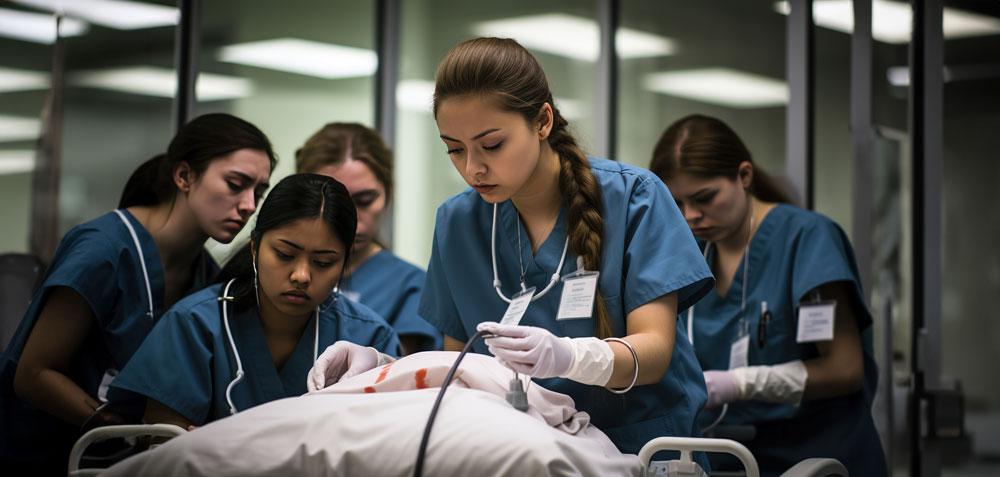Catherine Langstreth, assistant principal of curriculum and stakeholder engagement, Bolton College explains how people in Bolton are supported into NHS careers.
The role of education providers in sustaining and supporting the healthcare workforce cannot be overstated. But no one provider can do this in isolation.
In Bolton, we’ve worked hard to establish and cement partnerships with other key players to allow us to take a whole-region approach in helping people get on the right pathway for a healthcare career, and thrive once they’re in that role.
This collaborative, consolidated approach can help to address two critical areas for the NHS: staffing shortfalls, and skills gaps within the existing workforce.
Crucially, it also means we can support people from ground zero - whether they are 16 years old or adults looking to re-skill – all the way through the learning journey and into continuing professional development (CPD).
What does this whole-region approach look like in Bolton? We’ve worked hard to achieve this in recent years.
Collaboration is partly enabled through the Bolton Vision partnership, which brings together key public sector service providers, and partly through proactively setting up a monthly meeting with key practitioners within Bolton NHS Trust, the University of Bolton and Bolton College.
We’re part of the University of Bolton group, which means we have a close relationship with the University and with the University Collegiate secondary school, in terms of feeder routes to help people progress.
But we’re also striving to go further and work closely with other education institutions, from primary and secondary schools to other further education providers, to clearly map out all the pathways open to people to pursue a career in health.
Outreach
This is in direct response to one fundamental challenge that the NHS is experiencing right now. It simply cannot cope with demand from schools and colleges to deliver educational outreach days – which typically entails engaging with each school or college on an individual basis, and is a huge resource strain on an already stretched workforce. We need to help streamline this.
We’re speaking to other education providers and stakeholders to do just that.
Our ambition is to develop a single Bolton-wide prospectus that outlines all health career options for people in Bolton, and all the feeder routes into that, whether it be T Levels, apprenticeships, A Levels, or community access courses.
It’s not about competing with other education providers. It’s about presenting what different routes are available so that each person can consider what the best option might be for them, and so that no child or adult who aspires to work in healthcare is left behind.
This year, we also intend to deliver a single Bolton NHS careers day, where the University group, local schools and the local community
will come together to showcase pathways into NHS careers. Hopefully, this makes educational outreach more manageable for our local NHS Trust and sets a precedent for years to come.
Regional partnerships have also helped us to create new opportunities for those not in education. For example, we’ve established new community pathways for adult learners, for which we have devolved funding in Greater Manchester.
We’ve collaborated with Greater Manchester Combined Authority and Bolton Council on how best to use that funding, and are subsequently running programmes across community centres offering routes back into study.
The implication for health careers? We have one cohort of learners who participated in a community healthcare taster course, went on to complete Level 2 and Level 3 apprenticeships at the College, and graduated last year from the University of Bolton with nursing degrees.
Creating local routes for local jobs in our NHS is a fantastic outcome from taking a collaborative approach – and it’s delivered a new group of nurses who might otherwise never have set foot on that path.
Skills gaps
Providing a strong pipeline of NHS employees is only one part of the problem. The other big part is plugging any skills gaps among existing clinical staff. This includes ensuring that technology that could help to ease NHS pressures can actually be used effectively.
In autumn 2023, the government announced a £30 million investment into medical technology for the NHS – but if staff don’t have the necessary skills to utilise that, its impact will be limited.
In November 2023, Bolton College was part of a cohort of Greater Manchester Colleges awarded almost £8.5 million in the Local Skills Improvement Fund (LSIF). This funding is invested into projects that tackle the priorities that emerged from the employer-led Local Skills Improvement Plan for each area.
In Greater Manchester, we’re the College leading on the health initiative for LSIF. We’re working with Bolton NHS Foundation Trust and the Christie NHS Foundation Trust, based in Manchester, to create an assessment tool that can assess the digital skills of the workforce.
Digitisation
Starting with midwifery, we’ll be working across different departments to establish whether staff can effectively use different devices and software.
Patient records is an example of one area we’ll be looking at. Paper is still relied upon heavily within Trusts, with notes at the end of patients’ beds and no link between hospitals and GPs.
We’ll be assessing what areas of a digitised patient record system staff might find difficult, and whether they require additional digital training.
It could also flag the need for training in other areas. For example, staff may need to improve their English skills if it’s their second language.
At the moment, it’s largely all guesswork as to where skills gaps really are and where training is required. Our assessments can standardise that process and make it easier to identify barriers.
We’ll be sharing our findings across Greater Manchester, as they will be relevant for other Trusts in the region.
So, whether it’s mapping out the different routes available to local people to put them on the right path for a health career, creating opportunities for those who may think the door has closed, or establishing and addressing skills gaps within the existing NHS workforce, collaboration is key.
If we are to tackle these issues successfully, we need consolidated regional approaches up and down the country, and I think Bolton could serve as a brilliant model for Trusts or education providers looking to forge closer partnerships.





